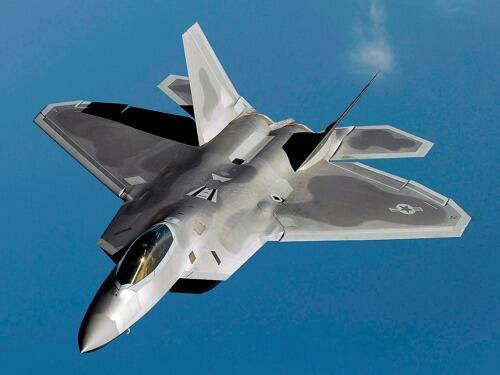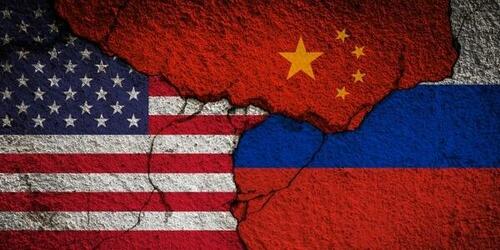
Authored by Nick Giambruno via InternationalMan.com,
The F-22 Raptor is the best air dominance warplane in the world.
It’s the top dog fighter jet.
The F-22’s advanced avionics, stealth capabilities, and maneuverability make it an unmatched platform for hunting and killing other aircraft.
While Russia, China, and several other nations have their own air dominance fighters, it’s doubtful they would fare well against an F-22 in air-to-air combat.
In short, the F-22 is critical to the US Air Force’s ability to control the skies in a potential conflict with a sophisticated enemy.
That’s why the F-22 Raptor is one of the few warplane models the US government does not export to any foreign country—not even to Israel or its NATO allies.
The F-22’s highly advanced stealth capabilities give it a significant edge over other air dominance fighter jets. In air-to-air combat, enemy fighter jets probably wouldn’t even know there was a Raptor nearby until it was too late.
The potential presence of an F-22 in an area would give any hostile air force an excellent reason to think twice before challenging the US Air Force.
That’s why the US stations F-22s in Japan as a deterrent to China’s air force should it make a move on Taiwan, for example.
However, all of this could change soon… and have enormous geopolitical implications.
The South China Morning Post has remained Hong Kong’s newspaper of record since British colonial rule.
They recently published a bombshell article claiming that Chinese researchers had developed a new radar detection technology that neutralizes the F-22’s stealth capabilities.
They claim that China’s radar system can now accurately pinpoint an F-22’s real-time position. This information could then be relayed to interceptor fighter jets or surface-to-air missile batteries to target the F-22.
If the claims are true, the impact on the F-22’s combat effectiveness would be huge. It would mean the US is unlikely to dominate the skies in a conflict with China.
That has tremendous consequences for the island of Taiwan.
Taiwan considers itself an independent nation with its own government, military, and foreign relations.
However, China views Taiwan as a breakaway province and has vowed to reunify it with the mainland by force if necessary. Recently, Xi privately warned Biden that China would reunify Taiwan, but the timing had not yet been decided.
While not explicitly committing to Taiwan’s defense, the US has been a significant supplier of military equipment to Taiwan. A Chinese invasion could trigger a response from the US military, though the extent and nature of this response are uncertain.
China has one of the world’s largest and increasingly modern militaries. Taiwan has a well-trained military, though smaller and less equipped than China’s.
In a military conflict, China seems to have the advantage. The only way Taiwan would have a prayer is if the US directly joined the conflict.
The US government has conducted various war games to simulate and prepare for a Chinese invasion of Taiwan. A key finding from these war games is that maintaining air superiority is critical for the US military to defend Taiwan successfully.
In other words, if the US cannot dominate the skies above Taiwan, it probably won’t be successful in repelling a Chinese invasion.
If the Chinese have compromised the F-22’s stealth capabilities, then I think it’s unlikely the US will achieve air superiority in case of a conflict in Taiwan. And if they can’t achieve air superiority, then their efforts are likely doomed to failure.
If the US understands that intervening in Taiwan is doomed to failure, they are likely to leave Taiwan to its fate, which means China will be successful in reunifying it with the mainland.
That would be a geopolitical earthquake and could fatally undermine the current US-led world order.
Taiwan is one of the three key proxy wars that will, I think, be decisive in who wins World War 3.
While many don’t realize it, World War 3 is already underway.
World War 3 and the New World Order
Total war between the world’s largest powers that reshuffled the international order defined the previous world wars.
However, with the advent of nuclear weapons, total war between the largest powers today—Russia, China, and the US—means a nuclear Armageddon where there are no winners and only losers.
That could still happen despite nobody wanting it, but it’s not the most likely outcome.
World War 3 is unlikely to be a direct kinetic war between the world’s largest powers, like the previous world wars.
Instead, the conflict is playing out on different levels—proxy wars, economic wars, financial wars, cyber wars, biological wars, deniable sabotage, and information wars.
Out of all these domains, I think proxy warfare will determine who wins World War 3.
Here’s the bottom line.
Russia, China, and their allies want to change the US-led world order that has been in place since the end of World War 2.
The conflict is playing out on a level that is below the threshold of direct kinetic warfare because that could invite a nuclear Armageddon.
Nonetheless, there is a conflict between the biggest global powers to determine the world order, as in the previous world wars.
As I see it, World War 3 is a conflict between two geopolitical blocks.
The first block consists of the US and its allies who have hitched their wagons to the unipolar world order.
I’m reluctant to call this block “the West” because the people who control it have values antithetical to Western Civilization.
A more fitting label would be NATO & Friends.
The other block comprises Russia, China, Iran, and other countries favorable to a multipolar world order.
Let’s call them the BRICS+, which stands for Brazil, Russia, India, China, South Africa, and other countries.
BRICS+ is not a perfect label, but it’s a decent representation of the countries favorable to the multipolar world order.
-
In short, BRICS+ wants to transform the current world order from unipolar to multipolar and give themselves a bigger seat at the table in the process.
-
NATO & Friends want the unipolar status quo to prevail.
-
That’s World War 3, and it’s happening right now.
It’s important to remember that world orders are nothing new.
World orders are how the big global powers have set the rules of the game for centuries. They are simply the architecture for international political relations between countries.
On a smaller scale, it’s similar to when the most powerful criminal groups in a given city—like mafias and street gangs—come together and agree on how to divide their activities and neighborhoods among themselves.
Sooner or later, though, these agreements always break down. Then, there is a violent power struggle until the criminal groups reach a new agreement reflecting the new power balance.
A similar dynamic is at play with the most powerful countries and world orders.
Conflicts among the most powerful countries typically lead to a breakdown and restructuring in the world order.
The current US-led world order was the result of World War 2.
Prior to that, the Treaty of Versailles created a new world order after World War 1 that lasted from 1919 to 1939.
Prior to that, the Congress of Vienna defined the world order. It lasted from Napoleon’s defeat in the early 1800s to the outbreak of World War 1 in 1914.
Prior to that, the Peace of Westphalia defined the world order. It lasted from the end of the Thirty Years’ War in 1648 until the outbreak of the Napoleonic Wars around the early 1800s.
Here’s the bottom line.
Changes to the world order are historical events with enormous implications—investment and otherwise.
We’re living through one of these rare times right now.
That’s why it’s crucial to sift through the noise and propaganda, put the pieces together correctly, and see the true geopolitical Big Picture.
Countless millions throughout history were wiped out financially—or worse—during the previous world wars because they failed to see the correct Big Picture and take appropriate action.
But what if you get the Big Picture right as World War 3 unfolds?
You can avoid disaster AND set yourself up to potentially make life-changing profits by acting on the investment implications of WW3 before others figure out what is really happening and how it’s likely to end.
It’s a rare fortune-building opportunity for those who understand what is happening and make the right moves today.
That’s exactly why I just released an urgent new report with all the details, including what you must do to prepare. It’s called The Most Dangerous Economic Crisis in 100 Years… the Top 3 Strategies You Need Right Now. Click here to download the PDF now.
Authored by Nick Giambruno via InternationalMan.com,
The F-22 Raptor is the best air dominance warplane in the world.
It’s the top dog fighter jet.
The F-22’s advanced avionics, stealth capabilities, and maneuverability make it an unmatched platform for hunting and killing other aircraft.
While Russia, China, and several other nations have their own air dominance fighters, it’s doubtful they would fare well against an F-22 in air-to-air combat.
In short, the F-22 is critical to the US Air Force’s ability to control the skies in a potential conflict with a sophisticated enemy.
That’s why the F-22 Raptor is one of the few warplane models the US government does not export to any foreign country—not even to Israel or its NATO allies.
The F-22’s highly advanced stealth capabilities give it a significant edge over other air dominance fighter jets. In air-to-air combat, enemy fighter jets probably wouldn’t even know there was a Raptor nearby until it was too late.
The potential presence of an F-22 in an area would give any hostile air force an excellent reason to think twice before challenging the US Air Force.
That’s why the US stations F-22s in Japan as a deterrent to China’s air force should it make a move on Taiwan, for example.
However, all of this could change soon… and have enormous geopolitical implications.
The South China Morning Post has remained Hong Kong’s newspaper of record since British colonial rule.
They recently published a bombshell article claiming that Chinese researchers had developed a new radar detection technology that neutralizes the F-22’s stealth capabilities.
They claim that China’s radar system can now accurately pinpoint an F-22’s real-time position. This information could then be relayed to interceptor fighter jets or surface-to-air missile batteries to target the F-22.
If the claims are true, the impact on the F-22’s combat effectiveness would be huge. It would mean the US is unlikely to dominate the skies in a conflict with China.
That has tremendous consequences for the island of Taiwan.
Taiwan considers itself an independent nation with its own government, military, and foreign relations.
However, China views Taiwan as a breakaway province and has vowed to reunify it with the mainland by force if necessary. Recently, Xi privately warned Biden that China would reunify Taiwan, but the timing had not yet been decided.
While not explicitly committing to Taiwan’s defense, the US has been a significant supplier of military equipment to Taiwan. A Chinese invasion could trigger a response from the US military, though the extent and nature of this response are uncertain.
China has one of the world’s largest and increasingly modern militaries. Taiwan has a well-trained military, though smaller and less equipped than China’s.
In a military conflict, China seems to have the advantage. The only way Taiwan would have a prayer is if the US directly joined the conflict.
The US government has conducted various war games to simulate and prepare for a Chinese invasion of Taiwan. A key finding from these war games is that maintaining air superiority is critical for the US military to defend Taiwan successfully.
In other words, if the US cannot dominate the skies above Taiwan, it probably won’t be successful in repelling a Chinese invasion.
If the Chinese have compromised the F-22’s stealth capabilities, then I think it’s unlikely the US will achieve air superiority in case of a conflict in Taiwan. And if they can’t achieve air superiority, then their efforts are likely doomed to failure.
If the US understands that intervening in Taiwan is doomed to failure, they are likely to leave Taiwan to its fate, which means China will be successful in reunifying it with the mainland.
That would be a geopolitical earthquake and could fatally undermine the current US-led world order.
Taiwan is one of the three key proxy wars that will, I think, be decisive in who wins World War 3.
While many don’t realize it, World War 3 is already underway.
World War 3 and the New World Order
Total war between the world’s largest powers that reshuffled the international order defined the previous world wars.
However, with the advent of nuclear weapons, total war between the largest powers today—Russia, China, and the US—means a nuclear Armageddon where there are no winners and only losers.
That could still happen despite nobody wanting it, but it’s not the most likely outcome.
World War 3 is unlikely to be a direct kinetic war between the world’s largest powers, like the previous world wars.
Instead, the conflict is playing out on different levels—proxy wars, economic wars, financial wars, cyber wars, biological wars, deniable sabotage, and information wars.
Out of all these domains, I think proxy warfare will determine who wins World War 3.
Here’s the bottom line.
Russia, China, and their allies want to change the US-led world order that has been in place since the end of World War 2.
The conflict is playing out on a level that is below the threshold of direct kinetic warfare because that could invite a nuclear Armageddon.
Nonetheless, there is a conflict between the biggest global powers to determine the world order, as in the previous world wars.
As I see it, World War 3 is a conflict between two geopolitical blocks.
The first block consists of the US and its allies who have hitched their wagons to the unipolar world order.
I’m reluctant to call this block “the West” because the people who control it have values antithetical to Western Civilization.
A more fitting label would be NATO & Friends.
The other block comprises Russia, China, Iran, and other countries favorable to a multipolar world order.
Let’s call them the BRICS+, which stands for Brazil, Russia, India, China, South Africa, and other countries.
BRICS+ is not a perfect label, but it’s a decent representation of the countries favorable to the multipolar world order.
-
In short, BRICS+ wants to transform the current world order from unipolar to multipolar and give themselves a bigger seat at the table in the process.
-
NATO & Friends want the unipolar status quo to prevail.
-
That’s World War 3, and it’s happening right now.
It’s important to remember that world orders are nothing new.
World orders are how the big global powers have set the rules of the game for centuries. They are simply the architecture for international political relations between countries.
On a smaller scale, it’s similar to when the most powerful criminal groups in a given city—like mafias and street gangs—come together and agree on how to divide their activities and neighborhoods among themselves.
Sooner or later, though, these agreements always break down. Then, there is a violent power struggle until the criminal groups reach a new agreement reflecting the new power balance.
A similar dynamic is at play with the most powerful countries and world orders.
Conflicts among the most powerful countries typically lead to a breakdown and restructuring in the world order.
The current US-led world order was the result of World War 2.
Prior to that, the Treaty of Versailles created a new world order after World War 1 that lasted from 1919 to 1939.
Prior to that, the Congress of Vienna defined the world order. It lasted from Napoleon’s defeat in the early 1800s to the outbreak of World War 1 in 1914.
Prior to that, the Peace of Westphalia defined the world order. It lasted from the end of the Thirty Years’ War in 1648 until the outbreak of the Napoleonic Wars around the early 1800s.
Here’s the bottom line.
Changes to the world order are historical events with enormous implications—investment and otherwise.
We’re living through one of these rare times right now.
That’s why it’s crucial to sift through the noise and propaganda, put the pieces together correctly, and see the true geopolitical Big Picture.
Countless millions throughout history were wiped out financially—or worse—during the previous world wars because they failed to see the correct Big Picture and take appropriate action.
But what if you get the Big Picture right as World War 3 unfolds?
You can avoid disaster AND set yourself up to potentially make life-changing profits by acting on the investment implications of WW3 before others figure out what is really happening and how it’s likely to end.
It’s a rare fortune-building opportunity for those who understand what is happening and make the right moves today.
That’s exactly why I just released an urgent new report with all the details, including what you must do to prepare. It’s called The Most Dangerous Economic Crisis in 100 Years… the Top 3 Strategies You Need Right Now. Click here to download the PDF now.
Loading…






